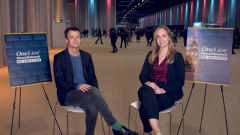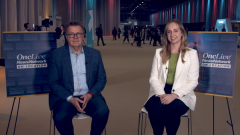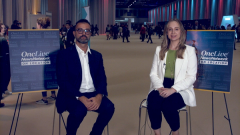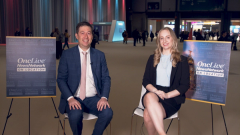
Understanding Unprecedented Data in Genitourinary Cancers From ESMO 2023: Dr Powles
OncLive® will be LIVE with OncLive® News Network: On Location at the 2023 ESMO Congress. Each day, we will broadcast a series of interviews with top thought leaders, to learn their thoughts and reactions to data presented across oncology during the conference.
Episodes in this series

OncLive® will be LIVE with OncLive® News Network: On Location at the 2022 ESMO Congress. Each day, we will broadcast a series of interviews with top thought leaders, to learn their thoughts and reactions to data presented across oncology during the conference.
Today-
We are reporting from the 2023 ESMO Congress!
Get ready for highlights of some of the top news presented each day during the meeting—and soon we’ll speak with Dr Thomas Powles to discuss some new data in genitourinary cancers.
Welcome to OncLive News Network! I’m Caroline Seymour.
Findings from the phase 3 KEYNOTE-585 trial (NCT03221426) showed that neoadjuvant treatment with pembrolizumab (Keytruda) plus chemotherapy followed by adjuvant pembrolizumab resulted in a significant improvement in pathologic complete response (pCR) vs placebo plus chemotherapy in patients with untreated, locally advanced resectable gastric and gastroesophageal cancer. With median follow-up of 47.7 and 46.3 months, respectively, the pathologic complete response (pCR) rates were 12.9% with pembrolizumab vs 2.0% with chemotherapy alone. Median event-free survival, though numerically improved with pembrolizumab was not statistically significant.
Moreover, the addition of perioperative durvalumab (Imfinzi) to FLOT chemotherapy led to a pCR and near pCR rate of 27% with durvalumab vs 14% with chemotherapy alone in patients with resectable gastric and gastroesophageal junction cancer in the phase 3 MATTERHORN trial (NCT04592913).
In the phase 3 LITESPARK-005 trial (NCT04195750), belzutifan (Welireg) induced a statistically significant improvement in progression-free survival (PFS) and objective response rate compared with everolimus as second- or later-line therapy for patients with advanced renal cell carcinoma. With median follow-up of 25.7 months, the 18-month PFS rates were 22.5% with belzutifan and 9.0% with everolimus.
Finally, in results from the phase 3 EV-302 trial (NCT04223856), the combination of enfortumab vedotin-ejfv (Padcev) and pembrolizumab doubled PFS and overall survival vs chemotherapy in patients with treatment-naïve, locally advanced or metastatic urothelial cancer, with hazard ratios of 0.45 and 0.47, respectively.
Please be sure to check out more of our coverage from the 2023 ESMO Congress at OncLive.com.
That’s all for today. Tomorrow, we’ll sit down with Drs Pasi Janne, Filippo Pietrantonio, and Bruno Bastos, who will share their perspectives on breaking research in lung, gastrointestinal, and genitourinary cancers.
Thank you for watching OncLive News Network: On Location, I’m Caroline Seymour.








































